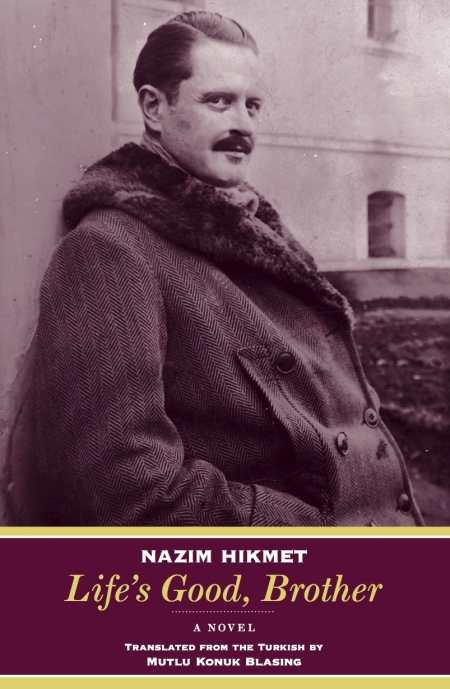Life's Good, Brother
The personal reflections of Turkish novelist Nazim Hikmet reach poetic heights in this memoir of a political agitator and his exile.
If history has any great benefit to human activity, it’s the ability to revive interest in things of quality that have been forgotten. It’s a nice surprise when artifacts that have been neglected by the modern world for a long time are brought back into the global spotlight, even if only for a short time. The good publishers at Persea Books have done this with Turkish poet and novelist Nazim Hikmet’s semi-autobiographical novel, Life’s Good, Brother. They have used history to bring readers a written gift of memory and experience.
Hikmet was many things in his lifetime, including an exile, a communist political agitator, and a dreaming romantic. He incorporates all of these qualities into Life’s Good, Brother. With a broken narrative that takes the reader from Turkey to Russia, from the coffee houses to the distant Ural wilderness, Hikmet seems to throw his whole chaotic life into less than two hundred pages, covering his political sympathies and their dire consequences within the circles of his rebellious friends to his lustful pursuit of the Russian Anushka, the love of his life but also his possibly unfaithful muse later on. The prose is sparse and disjointed, but it covers so much fleeting, nonlinear time that the reader is always left turning to the next page.
History is also an integral theme in the novel, but not like a typical period piece or historical novel. The protagonist, Ahmet Bey, speaks of himself in the third and first person while also adopting the perspective of his sickly brother, Ismail, either in bed or repeatedly roughing it in prison. Memories come in and out of the narrative, putting the reader either right on the street as the procession of Lenin’s body passes by and the elderly cry out or in the midst of the main characters fleeing authorities while hobnobbing with peasants and learning patchwork. Eventually the lines of time get so blurred that the whole plot dissolves to simply reveal the ultimate personal journey of a man’s never-ending search for life’s truths and loves.
The rogue quality of Life’s Good, Brother adds authentic potency. The personal reflections are humorous, the experimental delivery is exciting, and the drama is always profound. One would be hard pressed to find a similar personal reflection on the printed page that reaches such poetic heights.
Reviewed by
James Burt
Disclosure: This article is not an endorsement, but a review. The publisher of this book provided free copies of the book to have their book reviewed by a professional reviewer. No fee was paid by the publisher for this review. Foreword Reviews only recommends books that we love. Foreword Magazine, Inc. is disclosing this in accordance with the Federal Trade Commission’s 16 CFR, Part 255.

